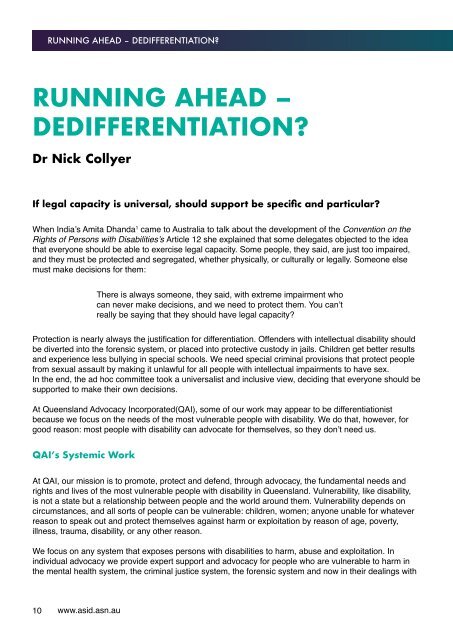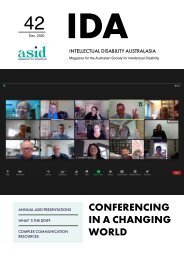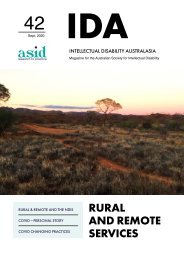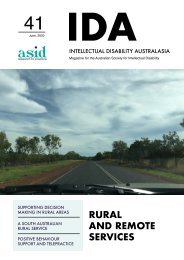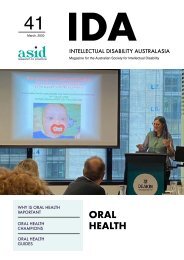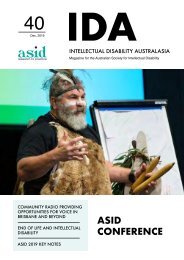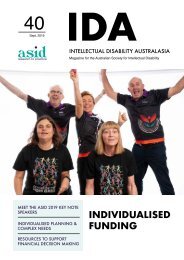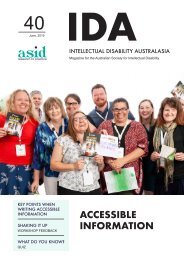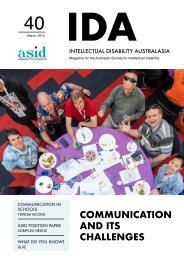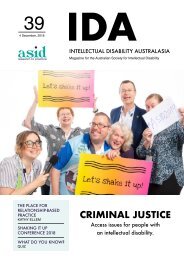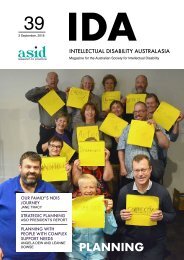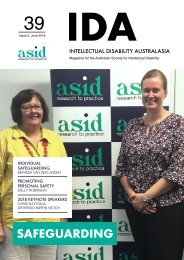IDA Magazine Vol 39 Iss 1 (Mar 2018)
Create successful ePaper yourself
Turn your PDF publications into a flip-book with our unique Google optimized e-Paper software.
RUNNING AHEAD – DEDIFFERENTIATION?<br />
RUNNING AHEAD –<br />
DEDIFFERENTIATION?<br />
Dr Nick Collyer<br />
If legal capacity is universal, should support be specific and particular?<br />
When India’s Amita Dhanda 1 came to Australia to talk about the development of the Convention on the<br />
Rights of Persons with Disabilities’s Article 12 she explained that some delegates objected to the idea<br />
that everyone should be able to exercise legal capacity. Some people, they said, are just too impaired,<br />
and they must be protected and segregated, whether physically, or culturally or legally. Someone else<br />
must make decisions for them:<br />
There is always someone, they said, with extreme impairment who<br />
can never make decisions, and we need to protect them. You can’t<br />
really be saying that they should have legal capacity?<br />
Protection is nearly always the justification for differentiation. Offenders with intellectual disability should<br />
be diverted into the forensic system, or placed into protective custody in jails. Children get better results<br />
and experience less bullying in special schools. We need special criminal provisions that protect people<br />
from sexual assault by making it unlawful for all people with intellectual impairments to have sex.<br />
In the end, the ad hoc committee took a universalist and inclusive view, deciding that everyone should be<br />
supported to make their own decisions.<br />
At Queensland Advocacy Incorporated(QAI), some of our work may appear to be differentiationist<br />
because we focus on the needs of the most vulnerable people with disability. We do that, however, for<br />
good reason: most people with disability can advocate for themselves, so they don’t need us.<br />
QAI’s Systemic Work<br />
At QAI, our mission is to promote, protect and defend, through advocacy, the fundamental needs and<br />
rights and lives of the most vulnerable people with disability in Queensland. Vulnerability, like disability,<br />
is not a state but a relationship between people and the world around them. Vulnerability depends on<br />
circumstances, and all sorts of people can be vulnerable: children, women; anyone unable for whatever<br />
reason to speak out and protect themselves against harm or exploitation by reason of age, poverty,<br />
illness, trauma, disability, or any other reason.<br />
We focus on any system that exposes persons with disabilities to harm, abuse and exploitation. In<br />
individual advocacy we provide expert support and advocacy for people who are vulnerable to harm in<br />
the mental health system, the criminal justice system, the forensic system and now in their dealings with<br />
10 www.asid.asn.au


